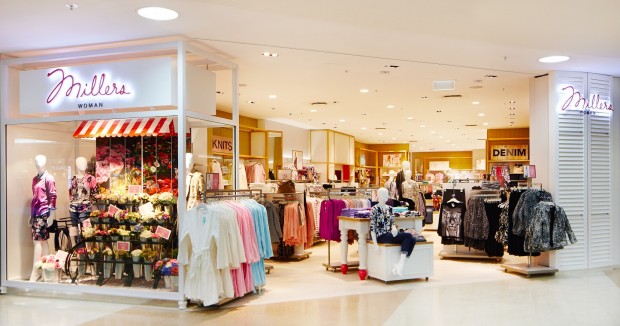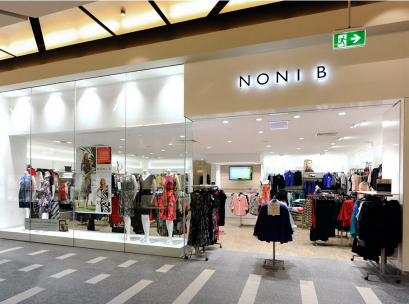When fiscal 16 ended Noni B was overseeing around $110 million in annual revenue across a relatively modest 220-store network.
A little under two years later the women’s apparel business is slated to end fiscal 18 with more 1,350 stores and almost $1 billion in annual revenue after acquiring the Katies, Millers, Autograph, Crossroads and Rivers brands from Specialty Fashion Group (ASX: SFH).
Emerging as one of the big fish in Australia’s apparel market Noni B and major shareholder Alceon Group will now look towards what may be the company’s toughest challenge yet.
The beleaguered SFH has spent several years trying to turnaround the five loss-making businesses, finally deciding to divest after a seven month review that found capital raising would be required to fund a turnaround.
But one company’s headache is another’s opportunity and with a $31 million price tag Noni B chairman Richard Facioni is pleased with the deal.
“We saw the value of the businesses and they, for whatever reason, couldn’t see themselves having an appetite to achieve that value,” he told Inside Retail.
“It’s one of those rare situations where you both look at each other and it works.”
Noni B will cover the deal with an equity raising of its own but expects to reap near dollar-for-dollar cost efficiencies from the acquisition by the end of fiscal 19, effectively paying for the upfront cost of the purchase.
That will just be the start of the challenges though, of which there are many.
Aside from incorporating a company with more than double its annual revenue, Noni B chief executive Scott Evans will be tasked with charting a path back to black for the struggling portfolio against a backdrop of unprecedented challenges in the market.
In 2017 the clothing, footwear and personal accessories category recorded total turnover growth of just 1.5 per cent, less than half the ten-year average annual growth rate of 3.5 per cent, according to ABS data.
While Evans doesn’t describe himself as bullish on the broader market he does believe he can move the brands from a combined $25.7 million EBIT loss in 2017 to a break-even point by the end of FY19.
“[Market conditions] are a very big realism but we’re pretty pessimistic in what we do … and we think we’ve planned for that,” Evans told Inside Retail.
Noni B has not disclosed the extent of its planned investment, but Evans said Noni B is willing to put in what’s needed to bring the brands around.
“We need to really understand what she’s saying and how we can best supply that demand,” he said. “Whether that’s transformation or a revolution … I couldn’t tell you right now.”

Finding black
Evans and his team will not be the first to wrangle with the portfolio, former SFH chief Gary Perlstein tried for several years to put the businesses on a path to sustainable growth, navigating destructive discounting as well as a large and expensive store network.
While returning Rivers (which it acquired in 2013) back to profitability in 2017, SFH found itself playing whack-a-mole with the variety of emerging challenges plaguing the company’s legacy portfolio.
Right sizing the portfolio became a key priority towards the end of Perlstein’s tenure, with more than 300 stores slated for closure under a restructuring plan.
Current SFH chief executive Daniel Bracken appears to have progressed on that part of the turnaround since being appointed earlier this year. While SFH said on Monday that there were 842 stores trading as at December 2017, Noni B said it expected to acquire 750 by June 2018.
IBISWorld analyst Kim Do thinks there will be more to come as Noni B uses a planned review of the portfolio to identify a suitable size for the network.
“We can expect Noni B to review the store footprint to ensure that they can minimise cannibalisation of sales of other brands in their portfolio. Hence, consumers can expect some store closures as the group identifies an optimal number of stores to operate,” she said.
Evans said a freeze will be placed on store openings over the next twelve months as the businesses are integrated, but beyond that believes many stores in the network can be turned around rather than closed, within reason.
“We want to help the team fix things and then hopefully grow those [stores] again,” he said. “These are stable household brands that everyone knows.”
Short term wins
There will be some easier short-term wins. Noni B will move from selling around 13 million garments a year to more than 40 million once the portfolio is acquired, delivering material cost savings in buying and supply chain operations.
Notably, Noni B will also benefit from a new 32,000sqm state of the art distribution centre that was just built by SFH in partnership with Toll Group.
Evans views the SFH portfolio as highly complimentary to its own business, particularly in the position of most of its portfolio as outside A-Grade high street centres, which are more exposed to typical fashion-related volatility.
The deal will also increase its exposure to the plus-size market without shifting its core competency from the mature women, an area that Euromonitor consultant Bettina Kurnik said remains influential.
“For all the talk of trying to crack the millennial market, there are still a vast number of Australian women who are looking for affordable fashion suited to more mature shoppers, with the additional advantage of buy-it-now accessibility through more traditional in-store channels,” she said.

Evans said it was too early to pre-empt what major changes would be undertaken, but store rebranding and the possibility of multi-owned branded stores will be considered.
Head office rationalisation, internal restructuring and procurement savings are expected to help generate $30 million in synergies by the end of FY19.
Owning women’s fashion
Retail analyst and Retail Oasis co director Pippa Kulmar said the deal reflected the need for consolidation in women’s fashion at a time when brands like Esprit were exiting the market.
“Noni B are really trying to own and consolidate the middle part of the market,” she said. “You’re seeing a fundamental shift in fashion where a lot of players are dropping out.”
IBISWorld’s Do said the competitive landscape would likely intensify as a result of the deal as Noni B pursues economies of scale with its newfound deal.
“Noni B is expected to revamp its new brands, similar to what it did to Rockmans and W Lane. This includes significant improvements to store look at feel,” she said.
Evans said he’s not delusional about what can be achieved but believes the change philosophy honed through the Noni B turnaround and the Pretty Girl acquisition will pay off in the coming years.
“We operate businesses pretty efficiently and pretty quickly, we’re quite nimble in how we act and who we are,” he said.
“We move quickly and if we’re wrong we learn from that.”






